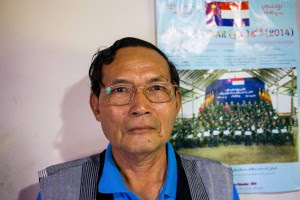Access to education in Karen State has been compromised by lack of accessible schools, poverty, war, displacement, and low wages for teachers – conditions made worse by a decades-long lack of government funding.
 Fighting to survive against successive brutal military dictatorships in Burma since 1949, the Karen people formed their own education system, completely separate from the central government. Burma’s moves towards democratic reform, however, have kindled cautious hopes that the country’s broken education system can be fixed, and incorporate ethnic voices.
Fighting to survive against successive brutal military dictatorships in Burma since 1949, the Karen people formed their own education system, completely separate from the central government. Burma’s moves towards democratic reform, however, have kindled cautious hopes that the country’s broken education system can be fixed, and incorporate ethnic voices.
To mark World Teacher’s Day 2014, Karen News spoke with Karen educators, including Podoh Saw La Say, head of the Karen National Union’s education department, about the challenges and opportunities for education as Burma undergoes tentative democratic reforms.
Padoh Saw La Say explained the challenges of melding the two education systems together effectively, specifically in a way which ensures that Karen people get to continue educating their youth about their history, culture and language, while also working within a national curriculum.
“Currently, there is a policy of centralized education, but we need a decentralized education system so as to encompass all of Burma’s ethnic diversity,” Padoh Saw La Saw said, “we need to operate under a national curriculum but one that is flexible to ethnic voices. Education is key to safeguarding our Karen culture.”
Padoh Saw La Saw said, “The biggest challenges are coming about from the wish of the central government to extend their education system into our areas without properly working with us. Our Karen teachers, some of whom have more than three decades experience, are being told what they need to teach by new Burmese teachers. Also there is a large discrepancy in the wage between Karen teachers and government teachers, which we need to sort out. It needs to be fair.”
Karen News spoke to teachers in Karen State about how, if at all, their work had changed since a 2012 preliminary ceasefire brokered between the Burma Army and the KNU.
Saw Sain Ler, a teacher from a government school, recalled teaching during the conflict, and said that the ceasefire had made teaching easier. “It was very difficult for students to go to school before the ceasefire. Things were expensive and we encountered many difficulties. Today, our leaders provide necessary materials for the schools and the students. And also, the government and UNICEF support the students and the schools. If we compare to before the ceasefire, we can see the improvement and development regarding the schools now.”
Naw Eh Ku, a Karen teacher, remembers teaching even when she and her students had to run from Burma Army offensives and said the ceasefire had made her work less difficult. “After the ceasefire we can now teach at school with more safety. Before the ceasefire, we were afraid that the government military would give us trouble if they came to our area. We had to run into the jungle when there was fighting. We had to teach under the bamboo and trees.
UNICEF’s latest education statistics on Burma noted that while a high portion of children get primary education, around 90%, only around 50% of children get to go to high school.
Padoh Saw La Say said that learning about all the ethnic groups in Burma, not just the Karen was important to fostering peace. “We need to develop our young people and continue strengthening our culture. At the same time, we need to recognize the importance of learning about the other ethnic groups of Burma so we can learn their values and have a better understanding of them.”
Burma’s latest budget statistics revealed that the government spent only 2.3% of its GDP on health and education, much lower than neighboring countries.



